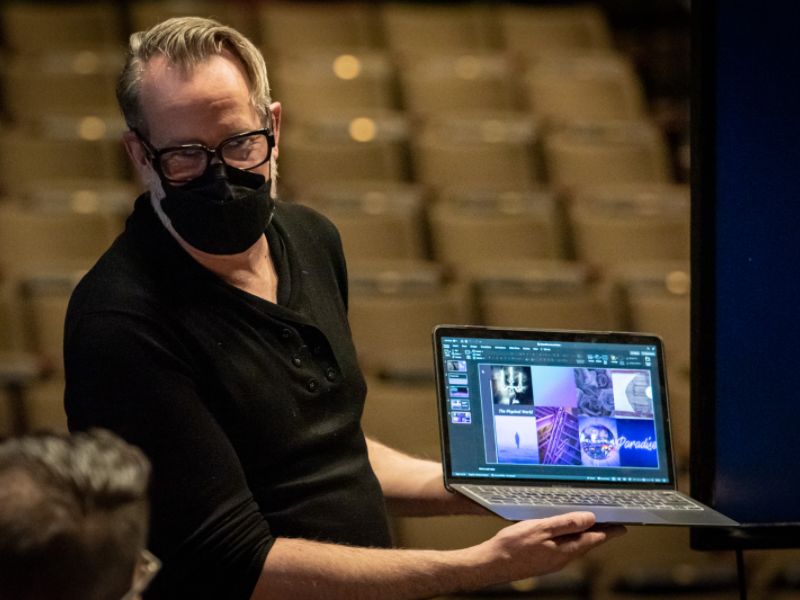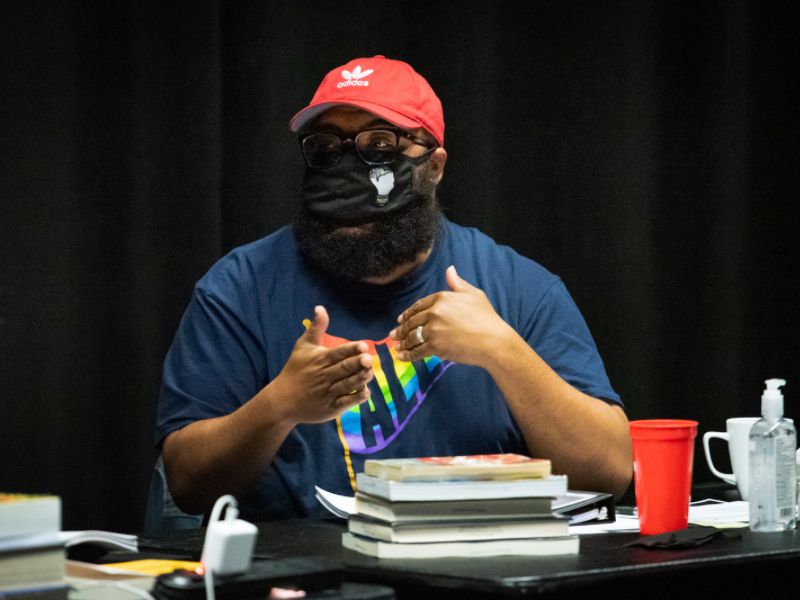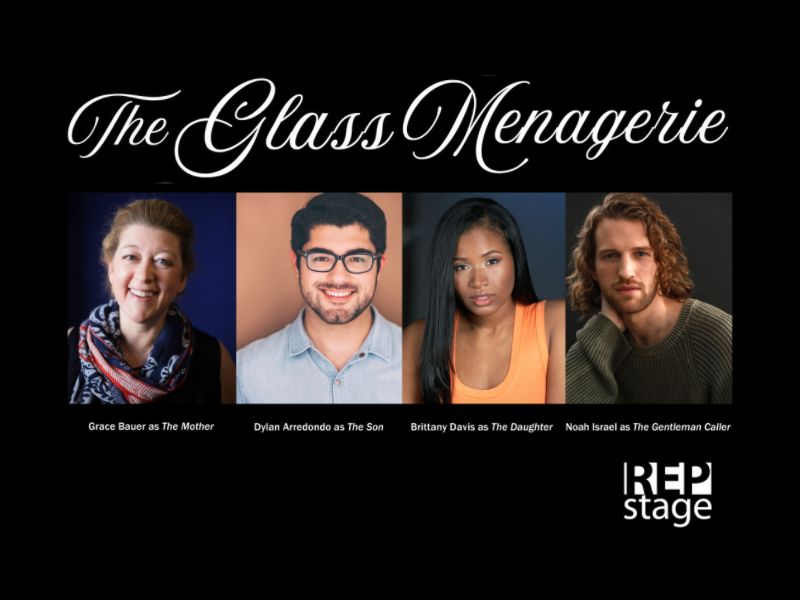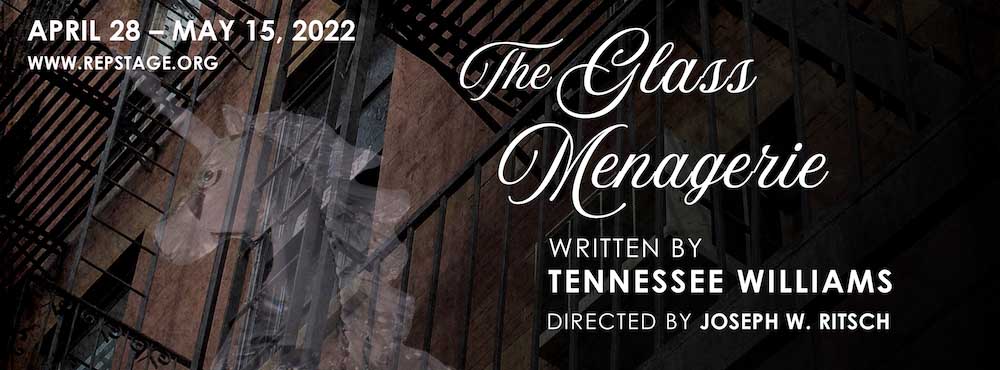Rep Stage returns to live, in-person performance with a rethink of an American classic. The professional regional theater in residence at Howard Community College in Columbia, Maryland, is telling the story of Tennessee Williams’s The Glass Menagerie with a cast that includes a Black Laura and a multi-racial Tom.
Williams wrote the parts presumptively white. The play is set during the Great Depression in a cramped St. Louis apartment where Amanda Wingfield (Grace Bauer), a faded remnant of Southern gentility, lives with her seemingly aimless son, Tom (Dylan Arredondo), and her debilitatingly shy daughter, Laura (Brittany Davis). With their father absent, the siblings find comfort in distractions — alcohol, movies, and writing for Tom and a fragile collection of glass animals for Laura. Then a mysterious Gentleman Caller (Noah Israel) arrives for dinner.
Rep Stage, an explicitly anti-racist theater, has undertaken its conceptual casting of The Glass Menagerie with deep deliberation, as I was to learn from Producing Artistic Director Joseph W. Ritsch and Guest Dramaturg Dr. Khalid Yaya Long.
Dr. Long, who is on the faculty of Columbia College in Chicago, has brought his unique experience and viewpoint as a dramaturg to many theaters nationally, including several in the DMV. Ritsch, who programmed and directs Williams’s famous memory play, also freelance directs and choreographs at other theater and education institutions. They worked together closely on Glass Menagerie — which opens April 28, 2022, and runs to May 15 — and I had some questions for them both.
The Glass Menagerie is an American classic that no theatergoer should miss, so there’s every reason for someone who has never seen it to check it out at Rep Stage. But what will be original and illuminating about this production for someone who already knows the play?
Joseph W. Ritch, director: My desire was to create a production that returned to Williams’s original vision for the play. A “memory play” that defied the definition of the “realistic play.” A theatrical world in which “expressionism and all other unconventional techniques” bring us closer to a “penetrating and vivid expression of things as they are.” This of course raised several questions for me. What do our memories look like? What color are they? What is the scale of memory? What does a memory sound like?
Dr. Khalid Yaya Long, dramaturg: The Glass Menagerie is, without a doubt, an American classic written by one of the most celebrated playwrights to ever grace the American stage! And the world stage, for that matter. Rep Stage’s production, unlike so many other productions, follows Tennessee Williams’s call for the show not to be saturated in dramatic realism but to take artistic license and create a show that highlights the commonalities and differences of the human condition.

How did you conceptualize the casting? How does this casting affect the storytelling?
Joseph: What do our families look like? Are our families blood, blended, chosen, or any combination thereof? How are our families remembered? How are these answers different for each one of us yet somehow tell a similar story? And whether you’ve seen this play before or not, can you walk away seeing yourself, your mother, your sibling, or perhaps all, in our Wingfield family? These were all questions I was asking in putting together this cast. I was also interested in how race, queerness, gender, and ability intersect in a way that magnifies the desperate situations so many Americans in our country faced in the 1930s and how that is mirrored today in 2022.
Khalid: The casting for this production highlights that the American story belongs to everyone across racial lines. By presenting a mixed-race cast and thereby a mixed-raced family, the play acknowledges the complexities of race without castigating any one particular group.

What was your working relationship during preproduction and rehearsal? How and why did it begin, what has been the result?
Joseph: I always view my work with a dramaturg as a partnership, especially when working with Khalid. I have been fortunate to collaborate with him on several productions now, and his insights, intellect, and deep passion continue to inspire my process as well as add so many valuable layers to the production on the whole.
Khalid: For me as a dramaturg, much of my work is frontloaded. I worked with the director before the rehearsal process began to discuss his vision and concept for the show. My role as a researcher with a particular emphasis on cultural history was to support the director’s vision with research — research in terms of the period of the play, the life of Tennessee Williams, and research in terms of theater history.

What is the significance of this production in the context of Rep Stage as an explicitly anti-racist theater? Does the meaning of Tennessee Williams’s storytelling change?
Joseph: I believe this work toward an anti-racist theater ethos is ongoing. Part of that work is dismantling the structures of the process and who gets to contribute and how. And while the dramaturgical exploration of the play was deeply thought- and heart-provoking, it was equally important to me to continually acknowledge and examine what our identity-conscious casting of this production did to the text as well as honor the experience, individuality, and agency of the actors inhabiting our version of the story.
Khalid: Rep Stage has a long history of staging works that are challenging and thought-provoking. With The Glass Menagerie, Rep Stage continues in that tradition, primarily through the lens of conceptual casting. Furthermore, through conceptual casting, anti-racist theater can genuinely flourish as the production can be seen through various lenses and highlight several perspectives. In that sense, the show belongs to no one particular person or group but instead invites everyone to participate.
The Glass Menagerie plays from April 28 to May 15, 2022, presented by Rep Stage performing in the Rouse Company Foundation Studio Theatre at the Horowitz Visual and Performing Arts Center on the Howard Community College campus, 10901 Little Patuxent Parkway, Columbia, MD. Tickets are available online and are $40 for general admission, $35 for seniors and military, $15 for students with a current ID, and $20 on Thursdays. For tickets and additional information, visit repstage.org or call the Horowitz Center Box Office at 443-518-1500 ext. 0. The box office is open Wednesdays through Fridays, 12 noon to 4 p.m. and 90 minutes prior to performance times.
CAST
Dylan Arredondo as Tom
Grace Bauer as Amanda
Brittany Davis as Laura
Noah Israel as Gentleman Caller
ARTISTIC TEAM
Director: Joseph W. Ritsch
Scenic & Props Design: Mollie Singer
Sound Design: Sarah O’Halloran
Lighting Design: Martha Mountain
Costume Design: Julie Potter
Stage Manager: Ricky Ramón
ABOUT REP STAGE
Rep Stage, the professional regional theater in residence at Howard Community College, produces engaging and evocative contemporary American classics and new works. Led by Producing Artistic Director Joseph W. Ritsch, Rep Stage is dedicated to collaborating with regional artists in its commitment to bringing richly diverse work to audiences. Recognized as a professional Washington, DC, metropolitan-area theater company by Theatre Washington, Rep Stage has a proud history of Helen Hayes Award-winning productions and nominations over its 28 years. The theater is a member of the Greater Baltimore Cultural Alliance and Theatre Communications Group. Performances are made possible by Howard Arts Council, Maryland State Arts Council, Howard County and Maryland state governments, and generous individual donors.






